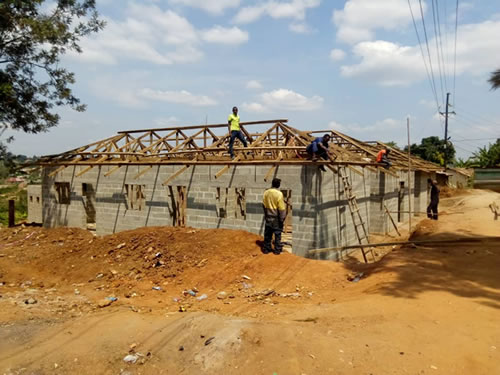 ON APRIL 1, Mass General Center for Global Health (CGH) partner Mbarara Regional Referral Hospital (MRRH) broke ground on a new temporary COVID-19 Treatment Center that will more than triple the hospital’s capacity to properly manage, isolate and treat patients with COVID-19 as well as other highly infectious diseases.
ON APRIL 1, Mass General Center for Global Health (CGH) partner Mbarara Regional Referral Hospital (MRRH) broke ground on a new temporary COVID-19 Treatment Center that will more than triple the hospital’s capacity to properly manage, isolate and treat patients with COVID-19 as well as other highly infectious diseases.
MRRH is a 600-bed hospital with a current full isolation capacity of only 16 beds housed in a temporary shed. The current Isolation Unit received its first COVID-19 patient on May 17. As of September 10, MRRH health workers have treated 66 confirmed COVID-19 cases—managing and discharging 59 of those patients (with an average stay of 17 days), and mourning the loss of one health worker. The six current IU admissions include two MRRH nurses.
“The new 58-bed facility will be crucial in the event that the pandemic worsens the need for in-patient hospitalization and care,” said Stephen Asiimwe, MBChB, MS, DrPH, Program Director of the Mbarara University of Science and Technology (MUST) Global Health Collaborative (GHC), CGH’s anchor program in Uganda.
Dr. Asiimwe and Annet Kembabazi, Program Manager for the MUST GHC, worked closely with key partners at MRRH, MUST, CGH Boston, the Uganda Ministry of Health (MOH) and the Mbarara regional COVID-19 task force to initiate construction of the additional facility on government-secured hospital land, using First Mile funding and leveraging structural drawings and building plans provided by Build Health International (BHI).
The First Mile program was launched in June 2018 in Mbarara, supported by the philanthropy of the Wyss Medical Foundation. Uganda’s Ministry of Health will ultimately contribute to the completion of the center.
Dr. Asiimwe reports that, even before COVID, the hospital was usually full, since the catchment area and population in the region includes more than 16 districts and 5–6 million people.
“From the onset of the pandemic, we realized that preparation for surge capacity was an urgent priority,” said Dr. Asiimwe. “The hospital and university leadership and the government of Uganda embraced this and were able to find land to build this facility quickly.”
Even before the hospital received its first positive case, First Mile support procured initial PPE and laid infrastructure for the community referral and monitoring of COVID patients. Resources were also used to train the current first responders at MRRH, the local clinical team, and screeners stationed at each entry and exit of the hospital, as well as to execute an initial Information Education and Communication (IEC) campaign about COVID-19 identification and prevention measures.
“I was inspired by the collaboration between the university (MUST) and the hospital (MRRH) and how rapidly they sprang into action to make this important initiative happen for their community,” said Emily Cable, First Mile Program Manager.
The structure received its roofing during the first week of July, and a 50-bed capacity was set up. The Uganda Ministry of Health (MOH) added a supplementary eight-bed epiTent and plans to add more tents as needed.
Although the structure is not set to be completed until October, the new facility will house its first patients soon.
“With the cases increasing currently, plans are underway to utilize this facility beginning with hosting several positive but asymptomatic cases that are currently quarantined at treatment centers in regional referral hospitals, per current MOH guidelines,” Dr. Asiimwe said.
The community, led in particular by the Mbarara regional COVID task force, is invested in the longevity of the development. The task force is led by the resident district commissioner and has multisectoral membership, with members representing the regional hospital, regional medical facilities, MUST, medical workers, political and religious leaders, as well as community representatives.
Sustained support for the community health system will be crucial to continue strengthening its COVID-19 and infectious disease response capacity. The hospital is faced with a health care worker shortage and running low on PPE; resource allocation between COVID cases and non-COVID patients is becoming challenging, and electricity is irregular in the existing ICU—a problem that completion of the new treatment center should help mitigate.
For now, the priority is managing the current outbreak of COVID-19. In the future, however, the facility will be used to isolate, observe, investigate, manage, and train medical workers in the care and management of highly infectious diseases such as COVID-19 and various viral hemorrhagic fevers like Ebola. MRRH also plans to add a reference clinical and research laboratory for highly infectious agents.

